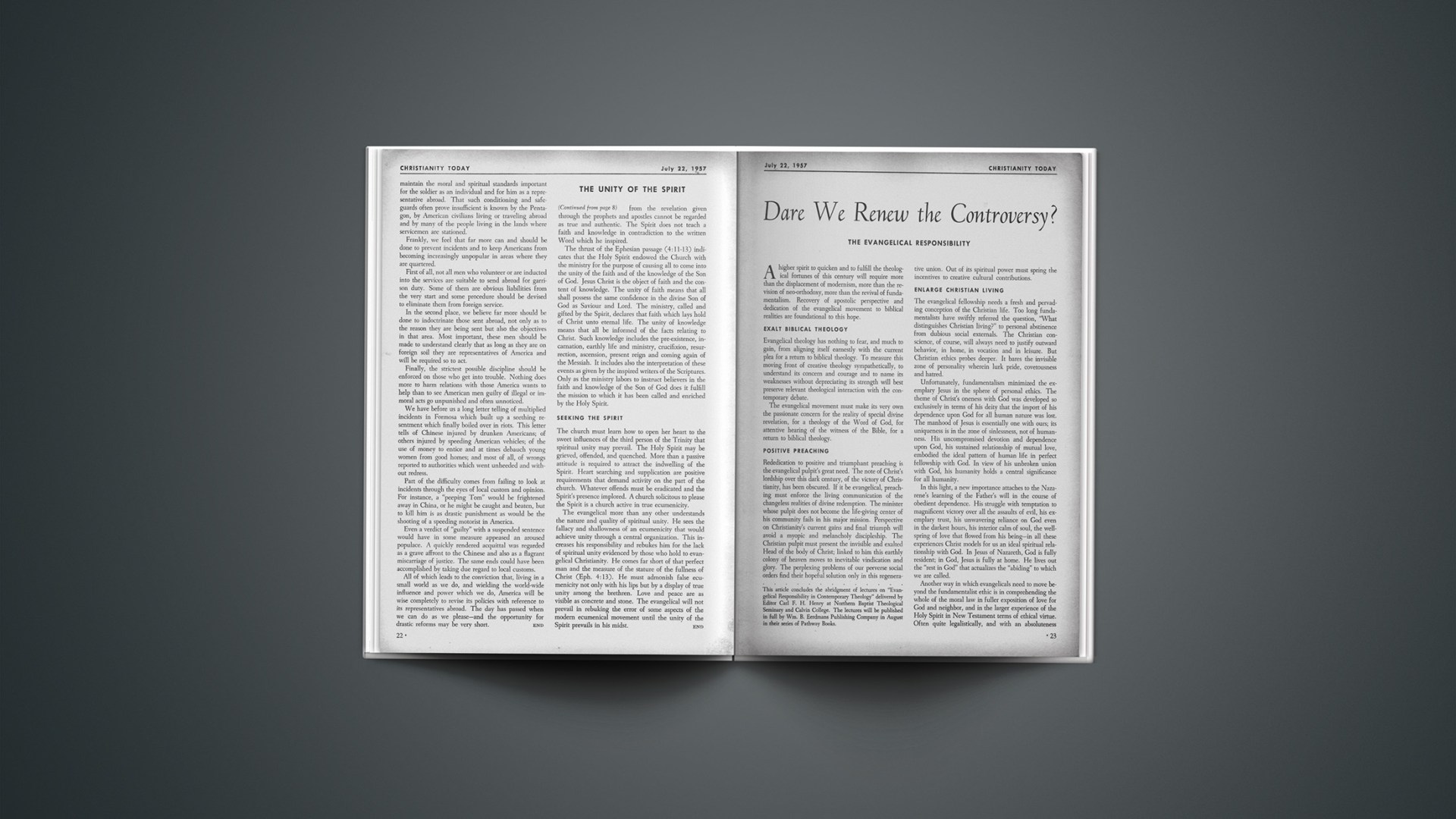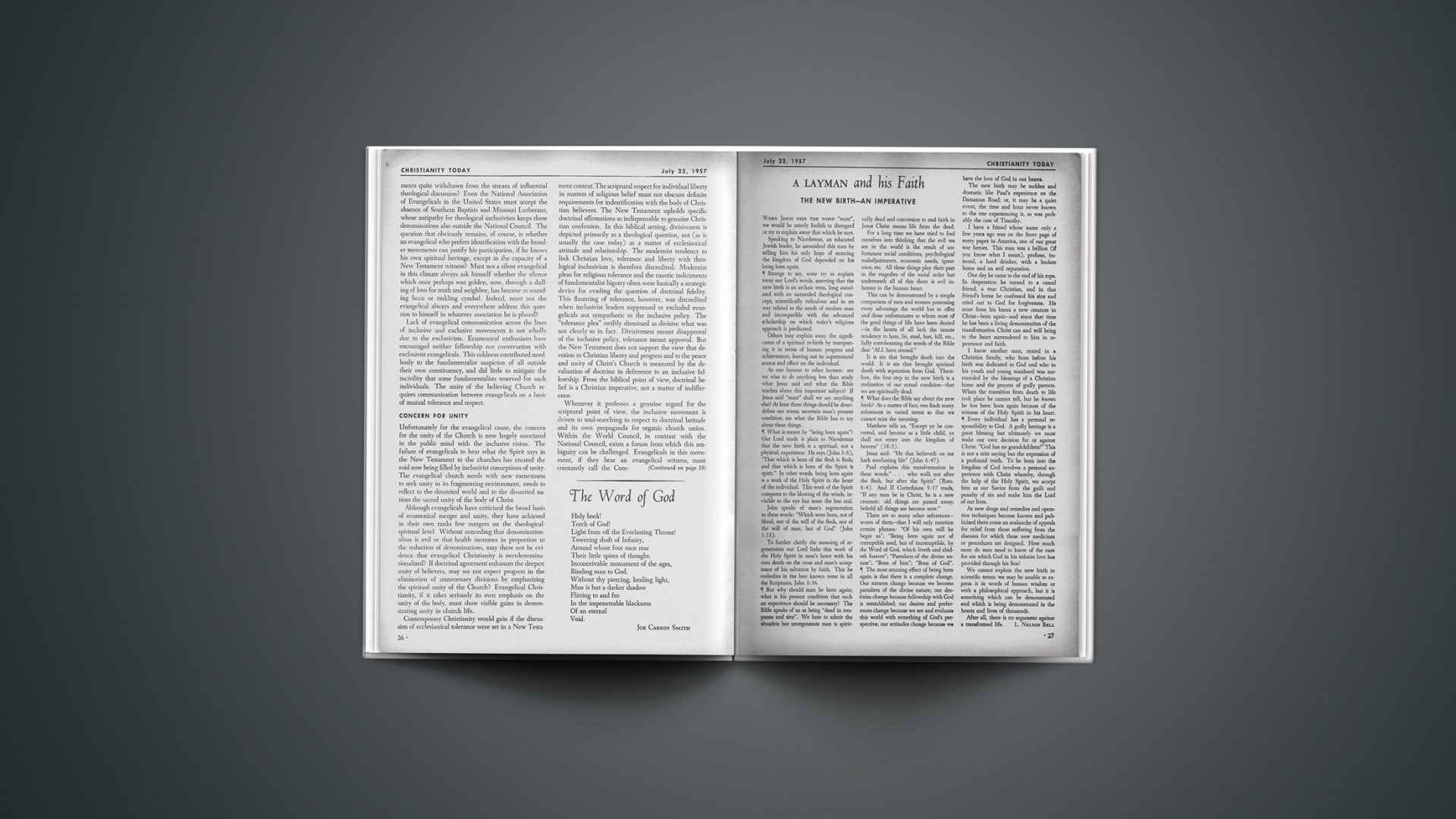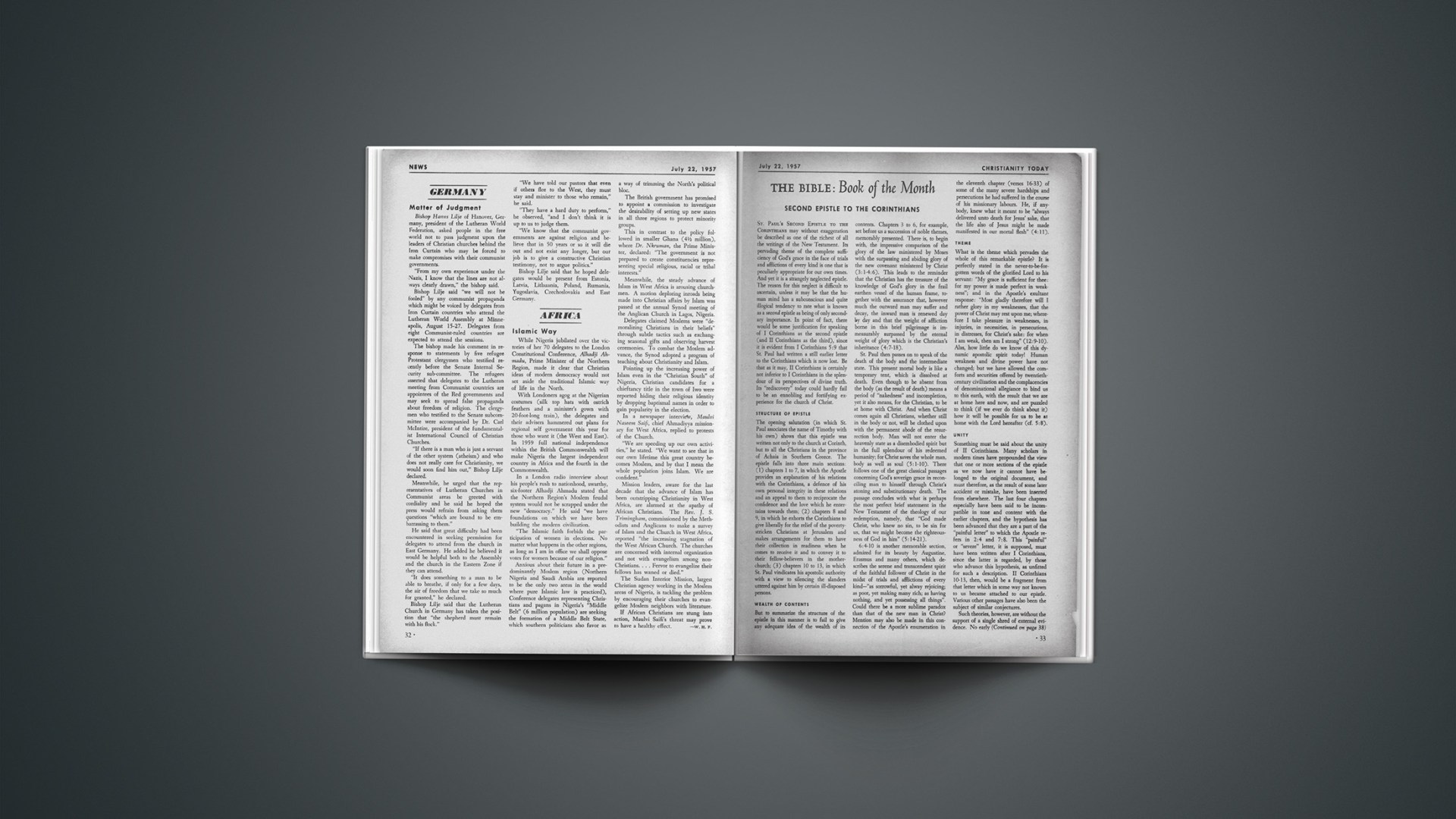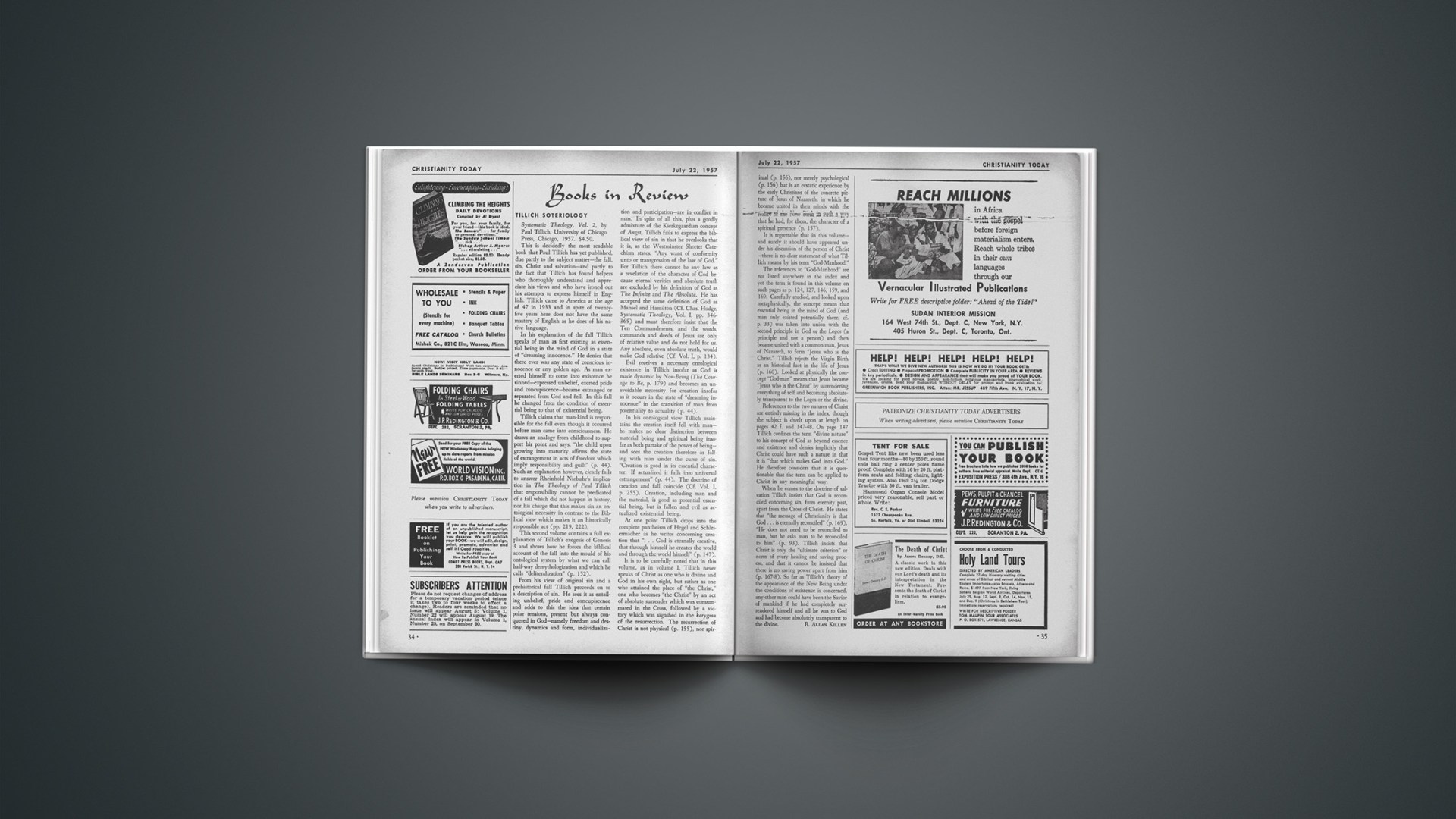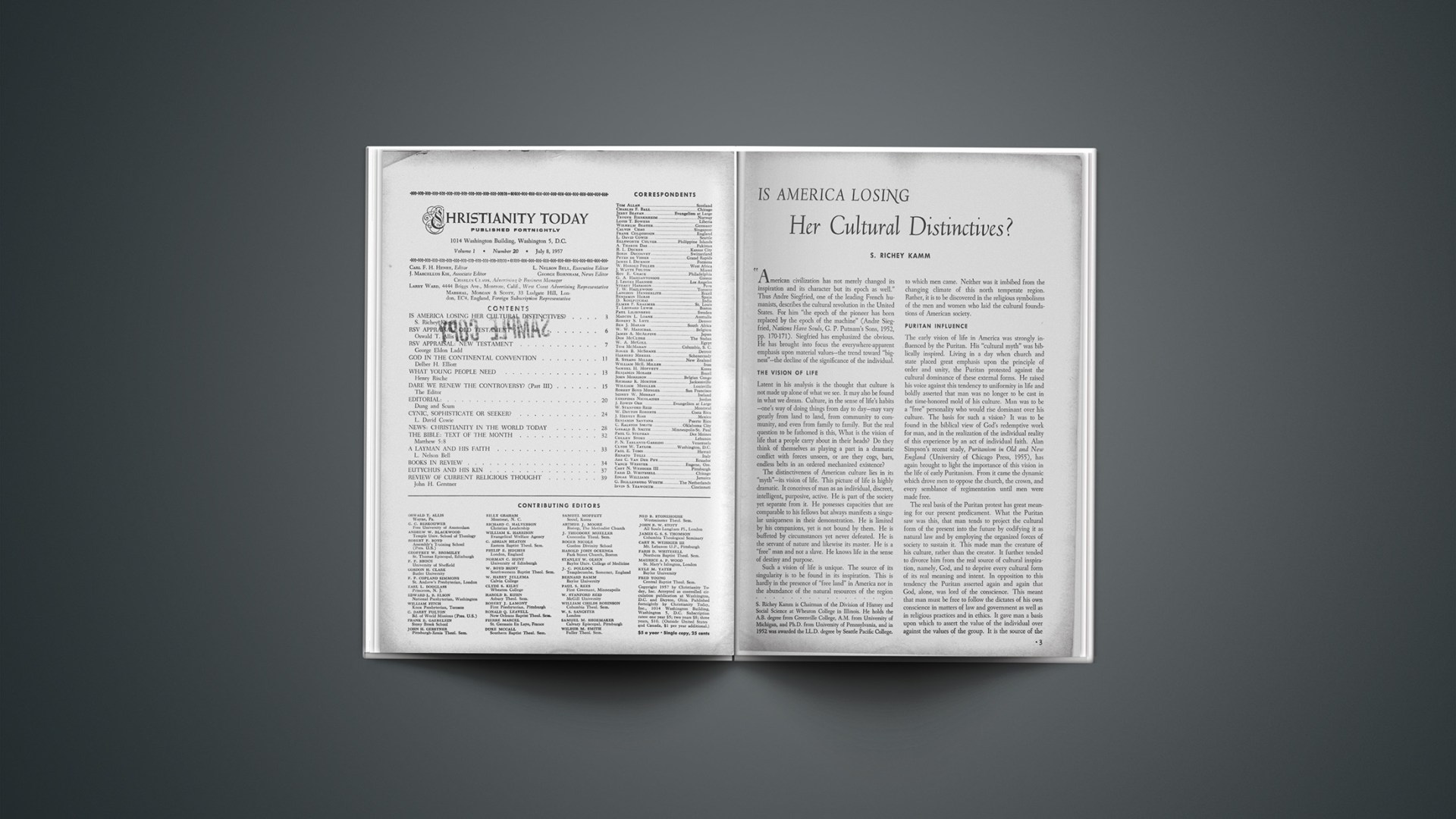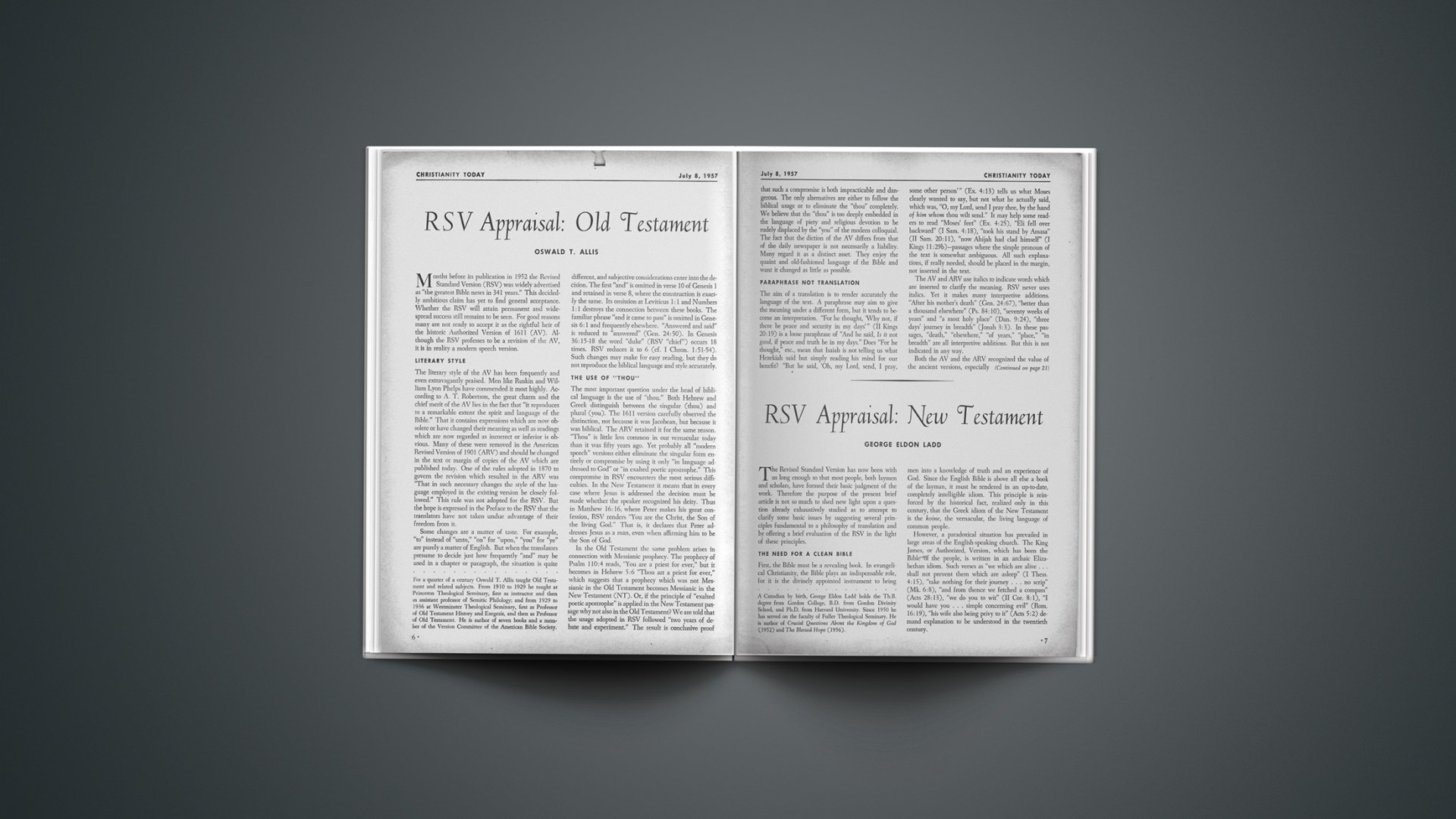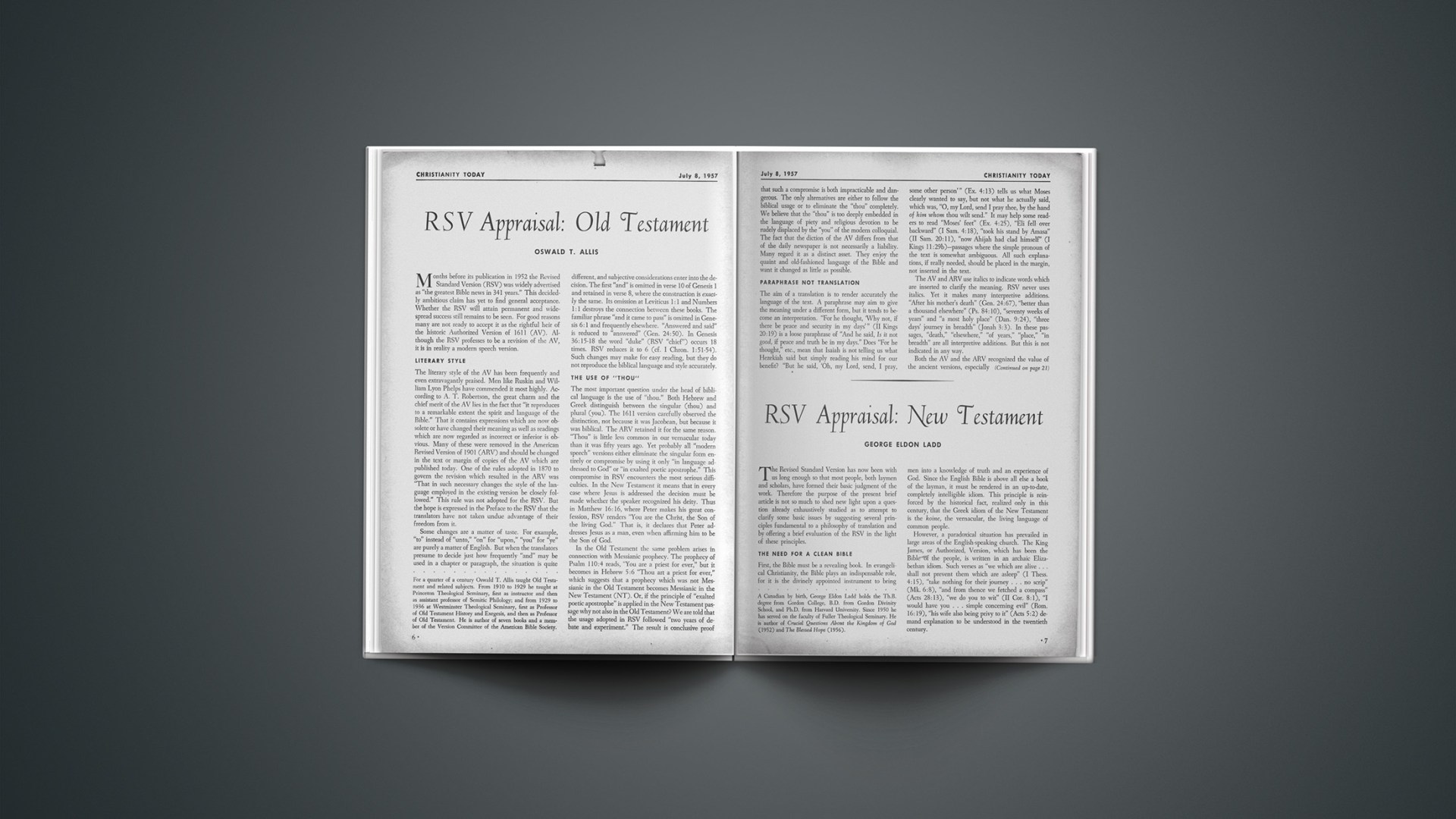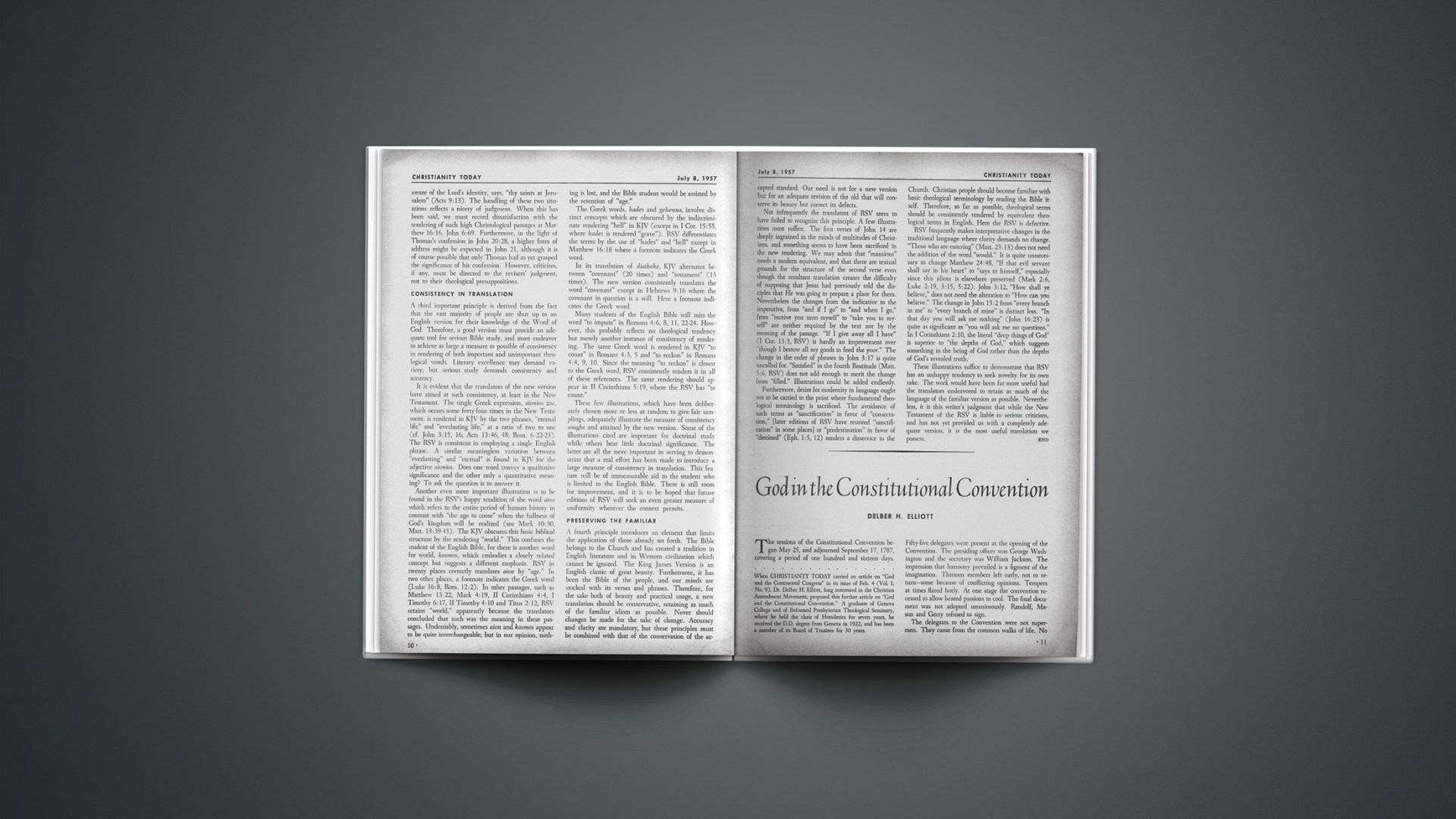A higher spirit to quicken and to fulfill the theological fortunes of this century will require more than the displacement of modernism, more than the revision of neo-orthodoxy, more than the revival of fundamentalism. Recovery of apostolic perspective and dedication of the evangelical movement to biblical realities are foundational to this hope.
Exalt Biblical Theology
Evangelical theology has nothing to fear, and much to gain, from aligning itself earnestly with the current plea for a return to biblical theology. To measure this moving front of creative theology sympathetically, to understand its concern and courage and to name its weaknesses without depreciating its strength will best preserve relevant theological interaction with the contemporary debate.
The evangelical movement must make its very own the passionate concern for the reality of special divine revelation, for a theology of the Word of God, for attentive hearing of the witness of the Bible, for a return to biblical theology.
Positive Preaching
Rededication to positive and triumphant preaching is the evangelical pulpit’s great need. The note of Christ’s lordship over this dark century, of the victory of Christianity, has been obscured. If it be evangelical, preaching must enforce the living communication of the changeless realities of divine redemption. The minister whose pulpit does not become the life-giving center of his community fails in his major mission. Perspective on Christianity’s current gains and final triumph will avoid a myopic and melancholy discipleship. The Christian pulpit must present the invisible and exalted Head of the body of Christ; linked to him this earthly colony of heaven moves to inevitable vindication and glory. The perplexing problems of our perverse social orders find their hopeful solution only in this regenerative union. Out of its spiritual power must spring the incentives to creative cultural contributions.
Enlarge Christian Living
The evangelical fellowship needs a fresh and pervading conception of the Christian life. Too long fundamentalists have swiftly referred the question, “What distinguishes Christian living?” to personal abstinence from dubious social externals. The Christian conscience, of course, will always need to justify outward behavior, in home, in vocation and in leisure. But Christian ethics probes deeper. It bares the invisible zone of personality wherein lurk pride, covetousness and hatred.
Unfortunately, fundamentalism minimized the exemplary Jesus in the sphere of personal ethics. The theme of Christ’s oneness with God was developed so exclusively in terms of his deity that the import of his dependence upon God for all human nature was lost. The manhood of Jesus is essentially one with ours; its uniqueness is in the zone of sinlessness, not of humanness. His uncompromised devotion and dependence upon God, his sustained relationship of mutual love, embodied the ideal pattern of human life in perfect fellowship with God. In view of his unbroken union with God, his humanity holds a central significance for all humanity.
In this light, a new importance attaches to the Nazarene’s learning of the Father’s will in the course of obedient dependence. His struggle with temptation to magnificent victory over all the assaults of evil, his exemplary trust, his unwavering reliance on God even in the darkest hours, his interior calm of soul, the well-spring of love that flowed from his being—in all these experiences Christ models for us an ideal spiritual relationship with God. In Jesus of Nazareth, God is fully resident; in God, Jesus is fully at home. He lives out the “rest in God” that actualizes the “abiding” to which we are called.
Another way in which evangelicals need to move beyond the fundamentalist ethic is in comprehending the whole of the moral law in fuller exposition of love for God and neighbor, and in the larger experience of the Holy Spirit in New Testament terms of ethical virtue. Often quite legalistically, and with an absoluteness beyond New Testament authority, fundamentalism’s doctrine of surrender, of rededication, has merely proscripted worldly practices, from which the believer was discouraged. Unemphasized, however, are the fruit of the Spirit and those many virtues which differentiate dedicated living in terms of biblical Christianity.
Social Concern
We need a new concern for the individual in the entirety of his Christian experience. He is a member of all life’s communities, of faith, of the family, of labor, of the state, of culture. Christianity is by no means the social gospel of modernism, but is nonetheless vibrant with social implications as a religion of redemptive transformation. To express and continue the vitality of the gospel message, marriage and the home, labor and economics, politics and the state, culture and the arts, in fact, every sphere of life, must evidence the lordship of Christ.
Obviously, the social application of Christian theology is no easy task. For one thing, fundamentalism fails to elaborate principles and programs of Christian social action because it fails to recognize the relevance of the gospel to the sociocultural sphere. Modernism defines Christian social imperatives in secular terms and uses the Church to reorganize unregenerate humanity. Its social sensitivity gave modernism no license to neglect the imperative of personal regeneration. Evangelistic and missionary priorities, on the other hand, gave fundamentalism no license to conceal the imperative of Christian social ethics. Despite the perils, no evasion of responsibility for meaningfully relating the gospel to the pressing problems of modern life is tolerable.
The divine life is a “being in love,” a social or a family fellowship in which personality expresses the outgoing, creative relationships of redemption. A worker by God’s creation, man sees vocation as a divinely entrusted stewardship by which to demonstrate love to God and service to man. As divinely ordained, the state declares God’s intention and the dignity of man’s responsibility for preserving justice and repressing iniquity in a sinful order. This world challenges man to interpret literature, art, music, and other media in reference to eternal order and values.
Approach To Science
Evangelical confidence in the ontological significance of reason makes possible a positive, courageous approach to science. For more than a century and a half modern philosophy has regrettably minimized the role of reason. Kant disjoined it from the spiritual world. Darwin naturalized and constricted it within the physical world. Dewey allowed it only a pragmatic or an instrumental role. These speculations took a heavy toll in Christian circles. A segment of evangelical Christianity nonetheless maintained its insistence upon the Logos as integral to the Godhead, the universe as a rational-purposive order, and man’s finite reason is related to the image of God.
Yet for more than a generation the evangelical attitude in scientific matters has been largely defensive. Evolutionary thought is met only obliquely. American fundamentalism often neglected scrutinizing its own position in the light of recent historical and scientific research. It even failed to buttress its convictions with rigorous theological supports.
Yet modernism, despite its eager pursuit of such revision, achieved no true correlation of Christianity and science. While modernism adjusted Christianity swiftly to the prevailing climate of technical conviction, its scientific respect was gained by a costly neglect of Christianity’s import to science.
Today a new mood pervades the scientific sphere. That mood may not fully validate the evangelical view of nature, but it does at least deflate the presuppositions on which the older liberalism built its bias against the miraculous. The evangelical movement is now given a strategic opportunity to transcend its hesitant attitude toward scientific endeavor, and to stress the realities of a rational, purposive universe that coheres in the Logos as the agent in creation, preservation, redemption, sanctification and judgment.
The ramifications of revelation and reason are wider, however, than science, for they embrace all the disciplines of learning. The evangelical attitude toward education itself is involved. The day has vanished when all the levels of learning, from primary to university, were in the service of God. Christianity cannot long thrive in an atmosphere in which mass education is allowed to repress and impugn Christian confidence and conviction. Christianity must not withdraw from the sphere of education, but must infuse it with new spirit and life. Christianity need evade neither truth nor fact, for it offers an adequate view of the universe in which we are driven daily to decision and duty. In answer to the present secular perspective in public education, shall evangelicals establish private Christian schools? Or shall they rather work for eternal verities within the present public school order or perhaps even pursue both courses? One fact is certain: evangelical neglect of education will imply the irrelevance of historic Christianity to the pressing problems of the contemporary academic world.
Doctrine Of The Church
The evangelical movement needs also the sustained study of the New Testament doctrine of the Church and a greater concern for the unity of regenerate believers. Its program for reflecting the unity of the body of Christ in contemporary history is inadequate in several regards.
Evangelical discussions of the unity of the Church are shaped to protest the ecumenical framework as a compromise to be avoided. Ecumenical Christianity blesses a cooperation broader than the New Testament fellowship; it needs to be reminded that not all union is sacred—that the more inclusive the union, the greater the danger of compromising and secularizing its Christian integrity. By contrast, the evangelical movement easily restricts cooperation more narrowly than does the Bible. It must learn that not all separation is expressive of Christian unity. The principle of separation itself may acquire an objectionable form and content, related more to divisive temper than to theological fidelity. In the face of the inclusive church movement, the evangelical spirit reacts too much toward independency. Through refusal to cooperate with believers whose theological conservatism and dedication to Christ are beyond question, evangelical Christianity is in danger of divisiveness and disruptiveness.
Sound Doctrine And New Life
Evangelical insistence that the unity of the body of Christ requires a basic doctrinal agreement and a regenerate membership is sound. The ecumenical temperament encourages the breakdown of denominational barriers at too great a price whenever it minimizes doctrinal positions. Interdenominationalism in our century has sprung from a peculiar assortment of motives. Fundamentalists stimulated denominational desertion through discontent with theologically inclusive programs ventured by liberal leadership in the established denominations. Such was not in actuality an antithesis to denominationalism, since denominational tenets were not called into question. Indeed, most evangelicals prefer to support New Testament programs within their own denominational lines, allowing interdenominational cooperation to spring from multidenominational dedication to common evangelical priorities. The compromise of priorities in denominational circles, however, led to interdenominationalism at the expense of denominationalism and quickened the sense of an extradenominational unity based on common doctrine and faith.
The liberal interdenominational urge had a different motivation, namely, a virtual depreciation of denominationalism as unworthy sectarianism insofar as any fixed creedal positions are affirmed. This exaltation of the experiential unity of the Church through the disparagement of doctrinal soundness is the great peril of ecumenical ecclesiology today. Its constant danger is the elevation of the concern for unity above the concern for truth.
Precision In Beliefs
Evangelical emphasis on an indispensable doctrinal basis for Church unity needs, however, to be defined with greater precision. Such concern accounts for evangelical uneasiness over the creedal vagrancy of the World Council of Churches whose nebulous emphasis is only on “Jesus Christ as Lord and Savior.” Since the evangelical movement includes churches that are both creedal and noncreedal in heritage, a specific creedal unity has not been elaborated, although common theological tenets are listed. This evangelical listing of a doctrinal minimum raises difficulties for creedal churches, inasmuch as they consider no article of faith dispensable. To Reformed churchmen, evangelical formulas often appear open to objectionable development. They prefer a strict creedal fellowship, a restriction that excludes progress toward the unity of diverse evangelical elements. The evangelical failure to fully elaborate essential doctrines has resulted in fragmentation by granting priority to secondary emphases (in such matters as eschatology). Evangelical Christianity has been slow to establish study conferences in biblical doctrine, to encourage mutual growth and understanding. Ironically, study sessions on theological issues are now often associated with movements whose doctrinal depth and concern are widely questioned. The significance of Christian doctrine, its dispensability or indispensability, its definition as witness or revelation, the elements identified respectively as core and periphery—these are issues on which evangelical Christianity must be vocal.
Fellowship Of Disciples
Evangelical Christianity too frequently limits the term “evangelical” to those identified with a limited number of movements. This needlessly stresses a sense of Christian minority and discourages cooperation and communication with unenlisted evangelicals. But the tensions of American church history in this turbulent century cannot be automatically superimposed upon all world evangelical communities. Ecumenical leadership in the Federal Council of Churches and its successor, the National Council of Churches, failed to reflect the viewpoint of that considerable genuinely evangelical segment of its constituency. In the World Council of Churches, leaders on the Continent also have often found themselves theologically far to the right of American spokesmen, and have found American evangelicals in the World Council disappointingly unvocal. Long before the establishment of organizations like the World Evangelical Fellowship, many European churches have approached the World Council in quest of an enlarging evangelical fellowship. Evangelical world alternatives to inclusive movements arose after most large historic denominations were already enlisted in the World Council. Does evangelical loyalty within these committed denominations necessarily depend upon public repudiation of the World Council, and upon entrance instead into minority movements quite withdrawn from the stream of influential theological discussion? Even the National Association of Evangelicals in the United States must accept the absence of Southern Baptists and Missouri Lutherans, whose antipathy for theological inclusivism keeps these denominations also outside the National Council. The question that obviously remains, of course, is whether an evangelical who prefers identification with the broader movements can justify his participation, if he knows his own spiritual heritage, except in the capacity of a New Testament witness? Must not a silent evangelical in this climate always ask himself whether the silence which once perhaps was golden, now, through a dulling of love for truth and neighbor, has become as sounding brass or tinkling cymbal. Indeed, must not the evangelical always and everywhere address this question to himself in whatever association he is placed?
Lack of evangelical communication across the lines of inclusive and exclusive movements is not wholly due to the exclusivists. Ecumenical enthusiasts have encouraged neither fellowship nor conversation with exclusivist evangelicals. This coldness contributed needlessly to the fundamentalist suspicion of all outside their own constituency, and did little to mitigate the incivility that some fundamentalists reserved for such individuals. The unity of the believing Church re quires communication between evangelicals on a basis of mutual tolerance and respect.
Concern For Unity
Unfortunately for the evangelical cause, the concern for the unity of the Church is now largely associated in the public mind with the inclusive vision. The failure of evangelicals to hear what the Spirit says in the New Testament to the churches has created the void now being filled by inclusivist conceptions of unity. The evangelical church needs with new earnestness to seek unity in its fragmenting environment, needs to reflect to the disunited world and to the disunited nations the sacred unity of the body of Christ.
Although evangelicals have criticized the broad basis of ecumenical merger and unity, they have achieved in their own ranks few mergers on the theological-spiritual level. Without conceding that denominationalism is evil or that health increases in proportion to the reduction of denominations, may there not be evidence that evangelical Christianity is over denominationalized? If doctrinal agreement enhances the deepest unity of believers, may we not expect progress in the elimination of unnecessary divisions by emphasizing the spiritual unity of the Church? Evangelical Christianity, if it takes seriously its own emphasis on the unity of the body, must show visible gains in demonstrating unity in church life.
Contemporary Christianity would gain if the discussion of ecclesiastical tolerance were set in a New Testament context. The scriptural respect for individual liberty in matters of religious belief must not obscure definite requirements for indentification with the body of Christian believers. The New Testament upholds specific doctrinal affirmations as indispensable to genuine Christian confession. In this biblical setting, divisiveness is depicted primarily as a theological question, not (as is usually the case today) as a matter of ecclesiastical attitude and relationship. The modernist tendency to link Christian love, tolerance and liberty with theological inclusivism is therefore discredited. Modernist pleas for religious tolerance and the caustic indictments of fundamentalist bigotry often were basically a strategic device for evading the question of doctrinal fidelity. This flaunting of tolerance, however, was discredited when inclusivist leaders suppressed or excluded evangelicals not sympathetic to the inclusive policy. The “tolerance plea” swiftly dismissed as divisive what was not clearly so in fact. Divisiveness meant disapproval of the inclusive policy, tolerance meant approval. But the New Testament does not support the view that devotion to Christian liberty and progress and to the peace and unity of Christ’s Church is measured by the devaluation of doctrine in deference to an inclusive fellowship. From the biblical point of view, doctrinal belief is a Christian imperative, not a matter of indifference.
Whenever it professes a genuine regard for the scriptural point of view, the inclusive movement is driven to soul-searching in respect to doctrinal latitude and its own propaganda for organic church union. Within the World Council, in contrast with the National Council, exists a forum from which this ambiguity can be challenged. Evangelicals in this movement, if they bear an evangelical witness, must constantly call the Commission on Faith and Order to judge the theological and ecclesiastical question from the standpoint of Scripture.
The fact must not be ignored, however, that different evangelical conceptions of the visible Church are prevalent. Although historically the Christian churches have all insisted upon a minimal theological assent for admission to membership, Reformed churches share Calvin’s view that even in the Church wheat and tares—professing and believing Christians—will dwell together until their final separation in the judgment. Baptist churches have traditionally placed greater emphasis on a regenerate membership and on a pure church. Even the disciplinary procedure of the more broadly conceived Reformed churches, however, considers church members flouting or indifferent to creedal standards as guilty as grave sin. Christian churches in the past stressed both a minimal requirement for membership and a maximal indulgence for avoidance of discipline or exclusion. But modernist leaders asserted the inevitability of doctrinal change. Heresy trials became an oddity in contemporary church history, not because of an absence of heresy, but because of the lack of zeal to prosecute heretics.
We dare not own any other authority over life and deed but the living God. We dare not own any other God than the righteous and merciful God revealed in Jesus Christ. We dare not own another Christ but Jesus of Nazareth, the Word become flesh who now by the Spirit is the exalted head of the body of believers. We dare not own any other Spirit than the Spirit who has breathed out Scripture through chosen men, that doubt may vanish about what God is saying to the Church and to the world. We dare not own any other Scripture than this Book. Let other men proclaim another god, another Christ, another spirit, another book or word—that is their privilege and their peril. But if once again the spiritual life of our world is to rise above the rubble of paganism into which it is now decaying, it will be only through the dynamic of revelation, regeneration, and redemption, through the sacred message which once brought hope. We have a task to do, a task of apostolic awesomeness; let us rise to the doing. The hour for rescue is distressingly late.
END
The Word Of God
Holy book!
Torch of God!
Light from off the Everlasting Throne!
Towering shaft of Infinity,
Around whose foot men rear
Their little spires of thought.
Inconceivable monument of the ages,
Binding man to God.
Without thy piercing, healing light,
Man is but a darker shadow
Flitting to and fro
In the impenetrable blackness
Of an eternal
Void.
JOE CARSON SMITH
This article concludes the abridgment of lectures on “Evangelical Responsibility in Contemporary Theology” delivered by Editor Carl F. H. Henry at Northern Baptist Theological Seminary and Calvin College. The lectures will be published in full by Wm. B. Eerdmans Publishing Company in August in their series of Pathway Books.

